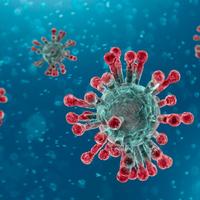4.Come avviene il contagio?
4. wie kommt es zu einer Ansteckung?
4.How does contagion occur?
4\. ¿Cómo ocurre el contagio?
4. Comment se produit la contagion ?
4.Hoe ontstaat besmetting?
4.Jak dochodzi do zarażenia?
4) Como ocorre o contágio?
4\. Enfeksiyon nasıl olur?
Il contagio avviene quando un paziente infetto, cioè che ha contratto il virus, si trova a stretto contatto con altre persone.
Eine Ansteckung tritt auf, wenn ein infizierter Patient, der sich mit dem Virus angesteckt hat, engen Kontakt mit anderen Menschen hat.
Contagion occurs when an infected patient, that is, who has contracted the virus, is in close contact with other people.
Bulaşma, enfekte bir hastanın, yani virüsü kapmış olan kişinin diğer insanlarla yakın temas halinde olmasıyla oluşur.
Il contagio può avvenire ovunque: in casa, al lavoro, su un mezzo di trasporto, in un ospedale ecc.
Ansteckung kann überall auftreten: zu Hause, am Arbeitsplatz, auf einem Transportmittel, in einem Krankenhaus usw.
Contagion can occur anywhere: at home, at work, on a means of transport, in a hospital, etc.
El contagio puede ocurrir en cualquier lugar: en casa, en el trabajo, en un medio de transporte, en un hospital, etc.
Bulaşma her yerde olabilir: evde, işte, ulaşım araçlarında, hastanede vb.
La via di trasmissione avviene attraverso la saliva, la tosse, gli starnuti; tramite contatti come abbracci, baci; tramite le mani sporche quando ci si tocca gli occhi, il naso, la bocca.
Der Übertragungsweg erfolgt durch Speichel, Husten, Niesen; durch Kontakte wie Umarmungen, Küsse; durch schmutzige Hände, wenn Sie Ihre Augen, Nase, Mund berühren.
The way of transmission occurs through saliva, cough, sneezing; through contacts such as hugs, kisses; through dirty hands when you touch your eyes, nose, mouth.
La vía de transmisión se da a través de la saliva, tos, estornudos; a través de contactos como abrazos, besos; a través de las manos sucias cuando se toca los ojos, la nariz, la boca.
Bulaşma yolu tükürük, öksürük, hapşırma yoluyla olur; sarılmalar, öpücükler gibi temaslar yoluyla; Kirli eller aracılığıyla gözlerinize, burnunuza, ağzınıza dokunduğunuzda.
Queste malattie respiratorie NON si trasmettono attraverso gli alimenti, ma bisogna sempre seguire le regole di igiene.
Diese Atemwegserkrankungen werden NICHT durch Lebensmittel übertragen, es müssen jedoch immer Hygieneregeln eingehalten werden.
These respiratory diseases are NOT transmitted through food, but hygiene rules must always be followed.
Bu solunum yolu hastalıkları yiyeceklerle bulaşmaz, ancak hijyen kurallarına her zaman uyulmalıdır.
Domande e risposte:
Fragen und Antworten:
Questions and answers:
Sorular ve cevaplar:
1.
1.
1.
1.
Come avviene il contagio?
Wie läuft die Infektion ab?
How does the infection occur?
Enfeksiyon nasıl olur?
Esso si trasmette quando una persona che ha già contratto il virus si trova molto vicino ad un'altra che ancora non ha la malattia.
Es wird übertragen, wenn eine Person, die sich bereits mit dem Virus infiziert hat, einer anderen, die die Krankheit noch nicht hat, sehr nahe steht.
It is transmitted when a person who has already contracted the virus is very close to another who does not yet have the disease.
Se transmite cuando una persona que ya ha contraído el virus está muy cerca de otra que aún no tiene la enfermedad.
Halihazırda virüse yakalanmış bir kişinin, henüz hastalığı olmayan bir başka kişiye çok yakın olması durumunda bulaşır.
2.
2.
Dove si può essere contagiati?
Wo kann man sich anstecken?
Where can you get infected?
¿Dónde te puedes contagiar?
Nereden enfekte olabilirsiniz?
Dappertutto: a casa, al lavoro, sui mezzi pubblici, negli ospedali…
everywhere|||||||||
Überall: zu Hause, bei der Arbeit, in öffentlichen Verkehrsmitteln, in Krankenhäusern ...
Everywhere: at home, at work, on public transport, in hospitals ...
En todas partes: en casa, en el trabajo, en el transporte público, en hospitales…
Her yerde: evde, işte, toplu taşımada, hastanelerde ...
3.
3.
3.
Come viene trasmesso il virus?
Wie wird das Virus übertragen?
How is the virus transmitted?
Virüs nasıl bulaşır?
Attraverso la saliva, la tosse, gli starnuti, ma anche con i baci, gli abbracci, le mani sporche.
|||||||||||kisses||hugs|||
Durch Speichel, Husten, Niesen, aber auch durch Küsse, Umarmungen, schmutzige Hände.
Through saliva, coughing, sneezing, but also with kisses, hugs, dirty hands.
Tükürük, öksürme, hapşırma yoluyla, ayrıca öpücüklerle, sarılmalarla, kirli ellerle.
4.
4.
Cosa NON si deve fare con le mani sporche?
Was sollten Sie NICHT mit schmutzigen Händen tun?
What should NOT be done with dirty hands?
Kirli ellerle ne YAPMAMALISINIZ?
Non bisogna MAI toccarsi la bocca, il naso, gli occhi.
Berühren Sie NIEMALS Mund, Nase, Augen.
You should NEVER touch your mouth, nose, eyes.
ASLA ağzınıza, burnunuza, gözlerinize dokunmayın.
5.
5.
La malattia respiratoria del coronavirus si trasmette anche attraverso gli alimenti?
Wird die Coronavirus-Atemwegserkrankung auch durch Lebensmittel übertragen?
Is coronavirus respiratory disease also transmitted through food?
Koronavirüs solunum yolu hastalığı gıda yoluyla da bulaşır mı?
No, ma è importante sempre seguire le norme igieniche previste.
Nein, aber es ist immer wichtig, die bereitgestellten Hygieneregeln einzuhalten.
No, but it is always important to follow the hygiene rules provided.
Hayır, ancak sağlanan hijyen kurallarına uymak her zaman önemlidir.

